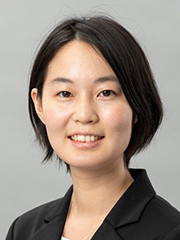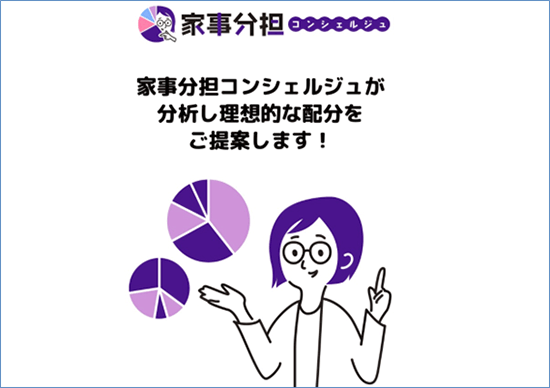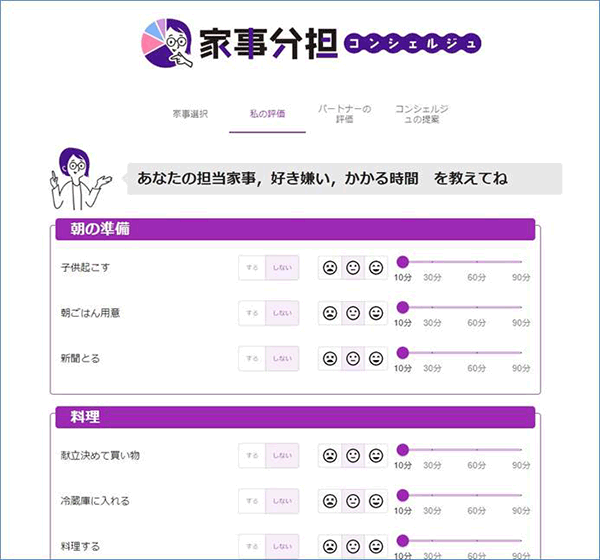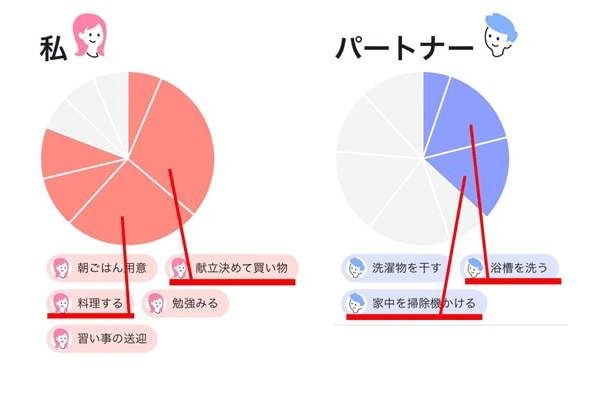Research Results
From sharing household chores to social structure
Creating a fair resource allocation mechanism leads to more people being happyFY2023

- IGARASHI Ayumi (Associate Professor, Graduate School of Information Science and Technology, The University of Tokyo)
- PRESTO
- Researcher (2020-2024), "Credible resource allocation" in the research area of "The fundamental technologies for Trustworthy AI"
If we can allocate fairly, everyone will be happy
While we face a situation where we have to allocate things fairly in a variety of everyday situations, from cutting cakes to assigning work and sharing housework, we also become the ones who are dealt things. What is fair varies from person to person, and it is difficult to allocate fairly and to everyone's satisfaction. Sometimes we get caught up in feelings of envy, such as "Is someone else benefiting? "or" Am I losing something?".
The fair division theory analyzes a resource allocation mechanism that considers how to divide various goods and services fairly. The purpose of this study is to mathematically define an uncertain concept of fairness, and to design an algorithm*1 that is as fair as possible and satisfactory to everyone.
Associate Professor Igarashi has published numerous research finding on "fair division theory", which mathematically analyzes resource allocation methods. In order to advance the research, the theme of "sharing household chores" was picked up, which involves many people. As a first step in making theory-based algorithms useful to society, an application for sharing household chores has been developed. The application "Sharing Household Chores Concierge" is a tool to visualize the sense of burden on individuals, and to consider how to share household chores in a more equitable way for all involved.
The application was developed in a program of the Science Impact Lab.*2 organized by the Japan Science and Technology Agency (JST).
*1 Algorithm
An algorithm is a procedure or calculation method that solves a problem or achieves a goal. It specifically and clearly indicates procedures for seeking answers, referring to certain computational procedures and processing methods that are incorporated into computer programs.
*2 Science Impact Lab
The Science Impact Lab is a co-creation program run by the Japan Science and Technology Agency (JST). "Researchers engaged in advanced research and development" and "players engaged in solving social issues" worked together for about three months.

Fig. 1 Top screen of "Sharing Household Chores Concierge". This application proposes the sharing of household chores with less burden on all parties involved.
url: https://kajibuntan.com/(Japanese only)
Fair algorithms that society needs
Advances in AI technology have led to widespread automation of various decision-making functions in everyday life. Along with this, ensuring fairness and transparency of decision-making algorithms, such as why AI made the decisions it did and whether there is any bias, has become an issue. In this situation, the fair division theory is attracting attention. In the United States, Web services for property division, rent sharing and class assignment using this theory have already been rolled out, and used by many people as soon as the services were developed. It shows that society demands such a system which has been analyzed with mathematical clarity.
Until now, fair division theory has focused on the allocation of divisible goods, such as money and time. In reality, however, there are many cases in which indivisible goods must be distributed. In recent years, therefore, there has been active research on the fair allocation of indivisible goods.
Unlike the case of divisible goods, the existence of envy-free allocation, or fair distribution, is not guaranteed for indivisible goods. Therefore, the key issue is whether the algorithm can deliver fairness that will satisfy as many people as possible.
If this issue could be solved, the resource allocation mechanism would have a wider range of application.
Aiming for an algorithm that can divide the indivisible
As regards the resource allocation mechanism, it is said that a completely fair and envy-free state cannot be achieved for the allocation of indivisible goods. Recently, however, it has become clear that there is an approximate fair allocation, i.e., one that minimizes the degree of envy of each of the parties involved, and that can be calculated efficiently.
Taking household chores as an example, the sense of burden differs depending on the person’s strengths, weaknesses, and required time for the same chores. Without considering them, simply equalizing the number of chores doesn't feel fair to the parties concerned.
In this context, as regards the sharing of household chores, a situation in which no envy occurs in the distribution to others was defined as fairness. Two objectives were defined, i.e., to ensure that individual happiness is as great as possible, and to ensure that overall efficiency is as high as possible by reflecting individual preferences and degrees of expertise, and to achieve them, objective indicators such as time and workload, and indicators that quantify values such as preferences, were incorporated into the calculations.
The application first surveys each person's "time taken" and "likes/dislikes" of household chores (Fig. 2). The degree to which each person feels burdened by household chores is quantified and visualized so that both persons are able to check with each other. After that, the application proposes a sharing plan that would make the chores feel less burdensome and fairer than they do now. Based on the calculation results, it is possible to facilitate constructive discussions (Fig. 3).
This system supports highly transparent decision-making by using mathematical methods to calculate optimal conditions. By proposing a very fair allocation, it is expected to bring about a distribution that makes everyone involved as happy as possible.

Fig. 2 To visualize the sense of burden, individual values such as "likes and dislikes" are entered into the application.

Fig. 3 The current burden of sharing household chores is visualized by a pie chart. This promotes understanding of each other's situation.
Distributing happiness from sharing household chores to social structure
In the allocation of indivisible goods, Assistant Professor Igarashi's research has shown that allocations exist which can efficiently calculate approximate fairness, and at the same time satisfy social optimality. These resource allocation mechanisms have the potential to be applied to large-scale systems. However, "What is the criterion of fairness?" and other concepts of fairness, as well as algorithms for finding measures to satisfy them, are difficult for the general public to understand. Without understanding this, algorithmic decision-making cannot ensure transparency and gain trust. In the future, it is expected that the explainability*3 of the algorithm will also be addressed to further expand the potential of the application.
If algorithms that distribute goods and services equitably can be utilized to help people resolve their dissatisfaction, it will make everyone as happy as possible. With more transparent, actuarial approaches, we may one day be able to bring about a fairer society.
*3 Explainability
Explainability refers to the ability of AI to explain "Why I gave the answer?" to the answers it derives. AI is increasingly making decisions in various aspects of society, and the ability to explain the basis for AI decisions has become a major issue.
